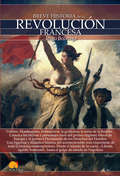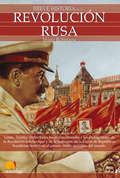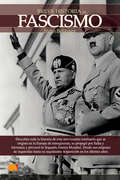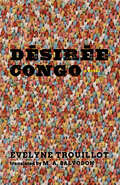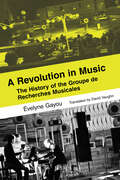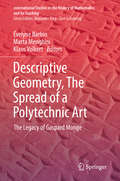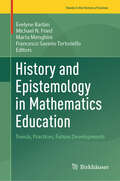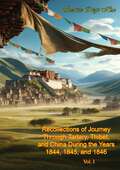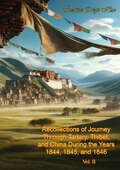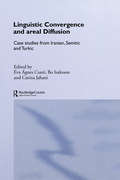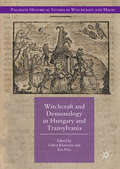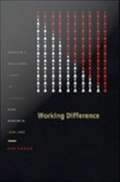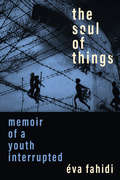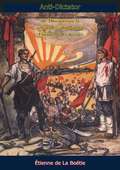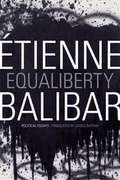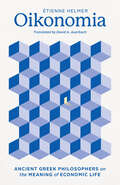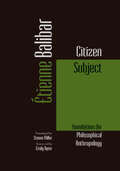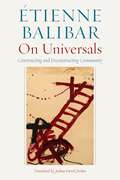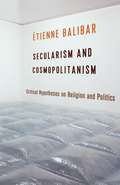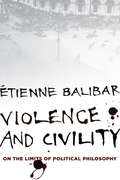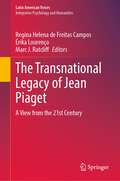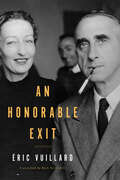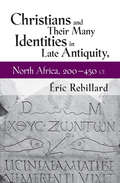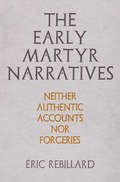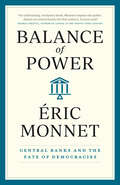- Table View
- List View
Breve historia de la Revolución Francesa (Breve Historia)
by Íñigo Bolinaga IrasueguiVoltaire, Montesquieu, Robespierre, la guillotina, la toma de la Bastilla… Conozca los hechos y personajes clave del primer régimen liberal de Europa y la primera Declaración de los Derechos del Hombre. Una rigurosa y didáctica historia del acontecimiento más importante de toda la historia contemporánea. Desde el triunfo de la razón, “liberté, égalité, fraternité” hasta el golpe de estado de Napoleón. La Revolución francesa se produjo gracias a hombres como Napoleón, Robespierre, Rousseau o Montesquieu. Un acontecimiento que supuso el fin del Antiguo Régimen y el origen de todos los movimientos políticos que crearon el mundo contemporáneo a lo largo del siglo XIX. En esta Breve Historia, Íñigo Bolinaga -con su habitual rigurosidad en lo histórico pero ameno y ágil al narrar los acontecimientos -hace un recorrido por la situación política, económica y social de una Francia en crisis y la aventura económicamente ruinosa de la intervención en la guerra de independencia de Estados Unidos fundamentales para contextualizar a Francia y comprender las causas directas del estallido revolucionario. Descubra los ideales ilustrados, y sucesos tan importantes como la revolución aristocrática, la suplantación de la monarquía absoluta por un gobierno popular basado en la libertad, tanto política como económica, la Noche de la Locura en la que la aristocracia renunció a sus privilegios feudales, la apertura de los Estados Generales en mayo de 1879, los desórdenes campesinos y la toma de la Bastilla, y la redacción de la tan ansiada constitución y la Declaración Universal de los Derechos del Hombre y el Ciudadano.
Breve historia de la Revolución rusa (Breve Historia)
by Íñigo Bolinaga IrasueguiEsta Breve historia de la Revolución rusa se detiene en estudiar los últimos días del zar Nicolás II, el espontáneo levantamiento de febrero de 1917, el pequeño periodo republicano que siguió después, con Alexander Kerensky a la cabeza y la posterior guerra civil que estalló finalmente, en la que el Ejército Rojo bisoño, construido por Trotsky, ganó permitiendo, así, a Lenin la construcción de un régimen socialista en Rusia y conformando un nuevo orden mundial. El libro, además, procura examinar las raíces que hicieron posible el triunfo bolchevique y que convirtieron a la Revolución rusa de 1917 en el acontecimiento político más importante del siglo XX. En esta obra se analiza, también cómo este periodo significó el final de una era, pues no solo destruyó el sistema monárquico como tipo de Estado, sino que creó un nuevo camino: el Estado Socialista.
Breve historia del Fascismo (Breve Historia)
by Íñigo Bolinaga IrasueguiUn estudio completo, de la mano de un experto conocedor del tema, que ofrece de forma ágil y amena un análisis de los aspectos más destacados del fascismo.
Désirée Congo (CARAF Books)
by Évelyne TrouillotThe newest English translation of one of Haiti&’s most powerful literary voices Désirée Congo is a riveting, powerful, and profoundly original novel set in the final years of the Haitian Revolution at the dawn of the nineteenth century. In this richly textured work, Trouillot—one of the leading voices of the francophone literary world—constructs an intricate narrative web from the varied experiences of freedmen and women, maroons, enslaved African people and their Creole children, as well as French planters and white smallholders in colonial Saint-Domingue at a historical moment of unthinkable upheaval. It is a moving, lyrical book whose strikingly realized characters enrich our understanding of the last confrontations between the Haitian revolutionaries and Napoleon&’s imperial forces—a conflict that resulted in the success of the largest slave revolt in recorded history and the independence of the first Black state in the western hemisphere.
A Revolution in Music: The History of the Groupe de Recherches Musicales
by Évelyne GayouEstablished in the 1950s by musician and engineer Pierre Schaeffer, the Groupe de Recherches Musicales would become the nerve center for avant-garde artists experimenting with sound and acoustics, as well as the birthplace of a genre of music-making enabled by new recording technologies and sound pioneers: musique concrète. Évelyne Gayou—herself a researcher, composer, and producer at the GRM—tells the history of the storied institution through the people, works, technologies, and research developed there. Placing musique concrète within a broad historical context extending from the early twentieth-century avant-garde's experiments with noise to the development of techniques in sound recording (at the Studio d'Essai in the 1940s) and later in sound synthesis, Gayou shows how recording technology made it possible for composers to not only create music from sounds in the world around them but also create acousmatic music—novel sounds without a visible connection to their source. Available in English translation for the first time, this updated edition will be an important resource for readers interested in the pioneering works and techniques of Schaeffer and his contemporaries, as well as their influence on the makers of new music and the contemporary avant-garde.
Descriptive Geometry, The Spread of a Polytechnic Art: The Legacy of Gaspard Monge (International Studies in the History of Mathematics and its Teaching)
by Klaus Volkert Évelyne Barbin Marta MenghiniThis book seeks to explore the history of descriptive geometry in relation to its circulation in the 19th century, which had been favoured by the transfers of the model of the École Polytechnique to other countries. The book also covers the diffusion of its teaching from higher instruction to technical and secondary teaching. In relation to that, there is analysis of the role of the institution – similar but definitely not identical in the different countries – in the field under consideration. The book contains chapters focused on different countries, areas, and institutions, written by specialists of the history of the field. Insights on descriptive geometry are provided in the context of the mathematical aspect, the aspect of teaching in particular to non-mathematicians, and the institutions themselves.
History and Epistemology in Mathematics Education: Trends, Practices, Future Developments (Trends in the History of Science)
by Michael N. Fried Évelyne Barbin Marta Menghini Francesco Saverio TortorielloThis book explores the evolving relationship between the history and epistemology of mathematics and mathematics education over the past fifty years. Beginning with the international movement that emerged in the 1970s, it celebrates the enduring and expanding role of historical and epistemological perspectives in shaping teaching practices. Organized into seven thematic sections, the volume examines core issues such as how historical and epistemological insights enhance understanding of mathematical concepts, interdisciplinarity as a tool for teaching, and innovative approaches to teacher training. It also delves into the use of historical problems, ancient texts, and textbooks as teaching resources, alongside an analysis of the social and political dimensions of mathematics education. Special attention is given to the impact of the "modern mathematics" reform and its legacy in rekindling interest in the history of mathematics in education. Featuring contributions from diverse geographical and historical contexts, this book is an essential resource for teachers, researchers, and anyone passionate about the rich interplay of history, epistemology, and mathematics.
Recollections of Journey Through Tartary, Thibet, and China During the Years 1844, 1845, and 1846 Vol. I (Recollections of Journey Through Tartary, Thibet, and China During the Years 1844, 1845, and 1846 #1)
by Évariste Régis Huc"Recollections of Journey Through Tartary, Thibet, and China During the Years 1844, 1845, and 1846" by Evariste Huc is an enthralling travel memoir that chronicles the author's remarkable expedition across some of the most remote and fascinating regions of Asia. Evariste Huc, a French missionary, provides an extraordinary firsthand account of his adventures and observations as he traversed the vast landscapes of Tartary (Central Asia), Tibet, and China during the mid-19th century.Huc's narrative is rich with vivid descriptions of the diverse cultures, peoples, and landscapes he encountered on his journey. From the vast steppes of Tartary to the majestic heights of the Tibetan plateau, and the intricate social fabric of imperial China, Huc's keen eye for detail and deep curiosity bring these distant lands to life. His encounters with nomadic tribes, Buddhist monks, and Chinese officials offer readers a rare glimpse into the lives and customs of these regions during a time of limited Western influence."Recollections of Journey Through Tartary, Thibet, and China" is more than just a travelogue; it is a valuable historical document that captures a pivotal moment in the cultural and political landscapes of Asia. Huc's reflections on the religious practices, political structures, and daily life of the people he met provide a comprehensive and nuanced understanding of these regions.Evariste Huc's eloquent and engaging writing style, combined with his perceptive insights and adventurous spirit, makes this book a timeless classic in the genre of travel literature. It is an essential read for historians, geographers, and anyone with an interest in the rich tapestry of Asian cultures and the history of exploration. Through Huc's eyes, readers are transported to a bygone era, experiencing the wonders and challenges of a journey through some of the most remote and mystical parts of the world.
Recollections of Journey Through Tartary, Thibet, and China During the Years 1844, 1845, and 1846 Vol. II (Recollections of Journey Through Tartary, Thibet, and China During the Years 1844, 1845, and 1846 #2)
by Évariste Régis Huc"Recollections of Journey Through Tartary, Thibet, and China During the Years 1844, 1845, and 1846" by Evariste Huc is an enthralling travel memoir that chronicles the author's remarkable expedition across some of the most remote and fascinating regions of Asia. Evariste Huc, a French missionary, provides an extraordinary firsthand account of his adventures and observations as he traversed the vast landscapes of Tartary (Central Asia), Tibet, and China during the mid-19th century.Huc's narrative is rich with vivid descriptions of the diverse cultures, peoples, and landscapes he encountered on his journey. From the vast steppes of Tartary to the majestic heights of the Tibetan plateau, and the intricate social fabric of imperial China, Huc's keen eye for detail and deep curiosity bring these distant lands to life. His encounters with nomadic tribes, Buddhist monks, and Chinese officials offer readers a rare glimpse into the lives and customs of these regions during a time of limited Western influence."Recollections of Journey Through Tartary, Thibet, and China" is more than just a travelogue; it is a valuable historical document that captures a pivotal moment in the cultural and political landscapes of Asia. Huc's reflections on the religious practices, political structures, and daily life of the people he met provide a comprehensive and nuanced understanding of these regions.Evariste Huc's eloquent and engaging writing style, combined with his perceptive insights and adventurous spirit, makes this book a timeless classic in the genre of travel literature. It is an essential read for historians, geographers, and anyone with an interest in the rich tapestry of Asian cultures and the history of exploration. Through Huc's eyes, readers are transported to a bygone era, experiencing the wonders and challenges of a journey through some of the most remote and mystical parts of the world.
Linguistic Convergence and Areal Diffusion: Case Studies from Iranian, Semitic and Turkic
by Éva Ágnes Csató Bo Isaksson Carina JahaniThe authors are outstanding scholars engaged in the study of language varieties spoken in 'convergence areas' in which speakers are multilingual in languages of at least two but sometimes all three language families. Many of the contributions present new data collected in fieldwork. The geographic area covered is Western and Central Asia where varieties of Iranian, Semitic and Turkic languages have entered into many different types of contact. The intricate linguistic contact situations demonstrate highly interesting convergence phenomena.
Witchcraft and Demonology in Hungary and Transylvania (Palgrave Historical Studies in Witchcraft and Magic)
by Gábor Klaniczay Éva PócsExamines urban and rural witchcraft conflicts from early modern times to the present.<P><P> Analyses the role of healers, midwives, and cunning folk in social, legal, medical and religious contexts.<P> Traces the decriminalisation of witchcraft and decline of persecution in Hungary and Transylvania.<P> This book provides a selection of studies on witchcraft and demonology by those involved in an interdisciplinary research group begun in Hungary thirty years ago. They examine urban and rural witchcraft conflicts from early modern times to the present, from a region hitherto rarely taken into consideration in witchcraft research. Special attention is given to healers, midwives, and cunning folk, including archaic sorcerer figures such as the táltos; whose ambivalent role is analysed in social, legal, medical and religious contexts. This volume examines how waves of persecution emerged and declined, and how witchcraft was decriminalised. Fascinating case-studies on vindictive witch-hunters, quarrelling neighbours, rivalling midwives, cunning shepherds, weather magician impostors, and exorcist Franciscan friars provide a colourful picture of Hungarian and Transylvanian folk beliefs and mythologies, as well as insights into historical and contemporary issues.
Working Difference: Women's Working Lives in Hungary and Austria, 1945-1995
by Éva FodorWorking Difference is one of the first comparative, historical studies of women's professional access to public institutions in a state socialist and a capitalist society. va Fodor examines women's inclusion in and exclusion from positions of authority in Austria and Hungary in the latter half of the twentieth century. Until the end of World War II women's lives in the two countries, which were once part of the same empire, followed similar paths, which only began to diverge after the communist takeover in Hungary in the late 1940s. Fodor takes advantage of Austria and Hungary's common history to carefully examine the effects of state socialism and the differing trajectories to social mobility and authority available to women in each country. Fodor brings qualitative and quantitative analyses to bear, combining statistical analyses of survey data, interviews with women managers in both countries, and archival materials including those from the previously classified archives of the Hungarian communist party and transcripts from sessions of the Austrian Parliament. She shows how women's access to power varied in degree and operated through different principles and mechanisms in accordance with the stratification systems of the respective countries. In Hungary women's mobility was curtailed by political means (often involving limited access to communist party membership), while in Austria women's professional advancement was affected by limited access to educational institutions and the labor market. Fodor discusses the legacies of Austria's and Hungary's "gender regimes" following the demise of state socialism and during the process of integration into the European Union.
The Soul of Things: Memoir of a Youth Interrupted
by Éva FahidiAn exceptional document of an extraordinary life, The Soul of Things is the memoir of Holocaust survivor Éva Fahidi. Since the memoir was first published in Hungarian in 2004 under the title Anima Rerum, Fahidi has become a household name in Hungary and in Germany. Featured in countless interviews and several prize-winning documentary films, at the age of ninety-five she is a frequent speaker at Holocaust commemorations in Hungary, Germany, and elsewhere. The Soul of Things combines a rare depiction of upper-middle-class Jewish life in pre-war Hungary with the chronicle of a woman’s deportation and survival in the camps. Fahidi is a gifted writer with a unique voice, full of wisdom, humanity, and flashes of dark humour. With an unsentimental, philosophical perspective, she recounts her journey from the Great Hungarian Plain to the extermination camp of Auschwitz-Birkenau, the forced labour camp of Münchmühle, and back. The English edition includes a new introduction by historians Éva Kovács and Judith Szapor, the original prefaces to the Hungarian and German editions, an essay on the Münchmüle Camp by Fritz Brinkman-Frisch, and extensive notes providing historical and cultural context for Fahidi’s narrative.
Anti-Dictator: the Discours sur la servitude volontaire of Étienne de La Boétie
by Étienne de La BoétieThis famous essay asserts that tyrants have power because the people give it to them. La Boetie linked together obedience and domination, a relationship which would be later elaborated by anarchist thinkers. By advocating a solution of simply refusing to support the tyrant, he became one of the earliest advocates of civil disobedience and nonviolent resistance. “To him, the great mystery of politics was obedience to rulers. Why in the world do people agree to be looted and otherwise oppressed by government overlords? It is not just fear, Boetie explains in “The Discourse on Voluntary Servitude,” for our consent is required. And that consent can be non-violently withdrawn.”—Lew Rockwell
Equaliberty: Political Essays
by Étienne Balibar Étienne IngramFirst published in French in 2010, Equaliberty brings together essays by Étienne Balibar, one of the preeminent political theorists of our time. The book is organized around equaliberty, a term coined by Balibar to connote the tension between the two ideals of modern democracy: equality (social rights and political representation) and liberty (the freedom citizens have to contest the social contract). He finds the tension between these different kinds of rights to be ingrained in the constitution of the modern nation-state and the contemporary welfare state. At the same time, he seeks to keep rights discourse open, eschewing natural entitlements in favor of a deterritorialized citizenship that could be expanded and invented anew in the age of globalization. Deeply engaged with other thinkers, including Arendt, Rancière, and Laclau, he posits a theory of the polity based on social relations. In Equaliberty Balibar brings both the continental and analytic philosophical traditions to bear on the conflicted relations between humanity and citizenship.
Oikonomia: Ancient Greek Philosophers on the Meaning of Economic Life
by Étienne HelmerA detailed analysis of oikonomia, an underexplored branch of knowledge in ancient Greek philosophy. In this book, Étienne Helmer offers a comprehensive analysis of oikonomia in ancient Greek philosophy. Despite its similarity to the word “economy,” for the ancients, oikonomia named a branch of knowledge—the science of management—that was aimed at studying the practices we engage in to satisfy our needs. This began with the domestic sphere, but it radiated outward from the oikos (house) to encompass broader issues in the polis (city) as well. Helmer explores topics such as gender roles and marriage, property and the household, the acquisition and preservation of material goods, and how Greek philosophers addressed the issue of slavery in the ancient world. Even if we are not likely to share many of ancient thinkers’ beliefs today, Helmer shows that there was once a way of thinking of “economic life” that went beyond the mere accumulation of wealth, representing a key point of departure for understanding how to inhabit the world with others.
Citizen Subject: Foundations for Philosophical Anthropology (Commonalities)
by Étienne BalibarWhat can the universals of political philosophy offer to those who experience "the living paradox of an inegalitarian construction of egalitarian citizenship"? Citizen Subject is the summation of Étienne Balibar’s career-long project to think the necessary and necessarily antagonistic relation between the categories of citizen and subject. In this magnum opus, the question of modernity is framed anew with special attention to the self-enunciation of the subject (in Descartes, Locke, Rousseau, and Derrida), the constitution of the community as “we” (in Hegel, Marx, and Tolstoy), and the aporia of the judgment of self and others (in Foucualt, Freud, Kelsen, and Blanchot).After the “humanist controversy” that preoccupied twentieth-century philosophy, Citizen Subject proposes foundations for philosophical anthropology today, in terms of two contrary movements: the becoming-citizen of the subject and the becoming-subject of the citizen. The citizen-subject who is constituted in the claim to a “right to have rights” (Arendt) cannot exist without an underside that contests and defies it. He—or she, because Balibar is concerned throughout this volume with questions of sexual difference—figures not only the social relation but also the discontent or the uneasiness at the heart of this relation. The human can be instituted only if it betrays itself by upholding “anthropological differences” that impose normality and identity as conditions of belonging to the community.The violence of “civil” bourgeois universality, Balibar argues, is greater (and less legitimate, therefore less stable) than that of theological or cosmological universality. Right is thus founded on insubordination, and emancipation derives its force from otherness.Ultimately, Citizen Subject offers a revolutionary rewriting of the dialectic of universality and differences in the bourgeois epoch, revealing in the relationship between the common and the universal a political gap at the heart of the universal itself.
On Universals: Constructing and Deconstructing Community (Commonalities)
by Étienne BalibarMany on the Left have looked upon “universal” as a dirty word, one that signals liberalism’s failure to recognize the masculinist and Eurocentric assumptions from which it proceeds. In rejecting universalism, we have learned to reorient politics around particulars, positionalities, identities, immanence, and multiple modernities. In this book, one of our most important political philosophers builds on these critiques of the tacit exclusions of Enlightenment thought, while at the same time working to rescue and reinvent what universal claims can offer for a revolutionary politics answerable to the common.In the contemporary quarrel of universals, Balibar shows, the stakes are no less than the future of our democracies. In dialogue with such philosophers as Alain Badiou, Judith Butler, and Jacques Rancière, he meticulously investigates the paradoxical processes by which the universal is constructed and deconstructed, instituted and challenged, in modern society. With critical rigor and keen historical insight, Balibar shows that every statement and institution of the universal—such as declarations of human rights—carry an exclusionary, particularizing principle within themselves and that every universalism immediately falls prey to countervailing universalisms. Always equivocal and plural, the universal is thus a persistent site of conflict within societies and within subjects themselves.And yet, Balibar suggests, the very conflict of the universal—constituted as an ever-unfolding performative contradiction—also provides the emancipatory force needed to reinvigorate and reimagine contemporary politics and philosophy. In conversation with a range of thinkers from Marx, Freud, and Benjamin through Foucault, Derrida, and Scott, Balibar shows the power that resides not in the adoption of a single universalism but in harnessing the energies made available by claims to universality in order to establish a common answerable to difference.
Secularism and Cosmopolitanism: Critical Hypotheses on Religion and Politics (European Perspectives: A Series in Social Thought and Cultural Criticism)
by Étienne BalibarWhat is the relationship between cosmopolitanism and secularism—the worldwide and the worldly? While cosmopolitan politics may seem inherently secular, existing forms of secularism risk undermining the universality of cosmopolitanism because they privilege the European tradition over all others and transform particular historical norms into enunciations of truth, valid for all cultures and all epochs. In this book, the noted philosopher Étienne Balibar explores the tensions lurking at this troubled nexus in order to advance a truly democratic and emancipatory cosmopolitanism, which requires a secularization of secularism itself.Balibar argues for the idea of the universal against its particular dominant institutions. He questions the assumptions that underlie popular ideas of secularism and religion and outlines the importance of a new critique for the contemporary world. Balibar holds that conflicts between religious and secular discourses need to be reframed from a point of view that takes into account the cultural hybridization, migration and mobility, and transformation of borders that have reshaped the postcolonial age. Among the topics discussed are the uses and misuses of the category of religion and the religious, the paradoxical genealogy of monotheism, French laïcité’s identitarian turn, and the implications of the responses to the Charlie Hebdo attacks for an extended definition of free speech. Going beyond circumscribed notions of religion and the public sphere, Secularism and Cosmopolitanism is a profound rethinking of identity and difference that seeks to make room for a renewed political imagination.
Violence and Civility: On the Limits of Political Philosophy (The Wellek Library Lectures)
by Étienne BalibarIn Violence and Civility, Étienne Balibar boldly confronts the insidious causes of violence, racism, nationalism, and ethnic cleansing worldwide, as well as mass poverty and dispossession. Through a novel synthesis of theory and empirical studies of contemporary violence, the acclaimed thinker pushes past the limits of political philosophy to reconceive war, revolution, sovereignty, and class.Through the pathbreaking thought of Derrida, Balibar builds a topography of cruelty converted into extremism by ideology, juxtaposing its subjective forms (identity delusions, the desire for extermination, and the pursuit of vengeance) and its objective manifestations (capitalist exploitation and an institutional disregard for life). Engaging with Marx, Hegel, Hobbes, Clausewitz, Schmitt, and Luxemburg, Balibar introduces a new, productive understanding of politics as antiviolence and a fresh approach to achieving and sustaining civility. Rooted in the principles of transformation and empowerment, this theory brings hope to a world increasingly divided even as it draws closer together.
The Transnational Legacy of Jean Piaget: A View from the 21st Century (Latin American Voices)
by Marc J. Ratcliff Regina Helena de Freitas Campos Érika LourençoThis book presents a collection of studies on the circulation of Jean Piaget’s ideas and works between Europe and Latin America, and how this transnational legacy influenced different fields of research and practice, such as psychology, education and philosophy. The volume brings together contributions presented at the International Colloquium Jean Piaget in Brazil and Latin America, held during the 38th Annual Helena Antipoff Meeting, organized by the Federal University of Minas Gerais, Brazil, in collaboration with the University of Geneva, Switzerland. The book is organized in three parts. Chapters in the first part analyze Piaget’s role as a builder of an international network in psychology, education and peace promotion in the 20th century, with a special focus on the circulation of his ideas and works between Switzerland and France. The second part focuses on historical and contemporary dialogues, conflicts and controversies between Piaget and other authors, such as Henri Wallon, Carl Rogers, Jürgen Habermas, and, especially, Helena Antipoff, the Russian-Brazilian psychologist and educator who was one of the first researchers to introduce Piaget in Brazil and to establish a bridge between Latin America and the Geneva school of psychological and educational sciences. Finally, chapters in the third part of the book explore different aspects of the reception and appropriation of Piaget’s works and ideas in the Brazilian context. The Transnational Legacy of Jean Piaget: A View from the 21st Century will be of interest to researchers in different fields within the human and social sciences, such as developmental, educational and school psychologists; educators; philosophers and historians of psychology and education interested in understanding how Piaget’s progressist ideas have contributed to the development of psychological and educational sciences in Europe and Latin America. Some chapters of this book were originally written in Portuguese and French and translated into English with the help of artificial intelligence. A subsequent human revision was done primarily in terms of content.
An Honorable Exit
by Éric VuillardFrom the award-winning author of The Order of the Day, a piercing account of the lesser-known conflict preceding the Vietnam War that dealt a fatal blow to French colonialism.How can a modern army lose to an army of peasants? Delving into the last gasps of the First Indochina War (1946–1954), which saw the communist Việt Minh take control of North Vietnam, Éric Vuillard vividly illustrates the attitudes that both enabled French colonialist abuses and ultimately led to their defeat and withdrawal. From the Michelin rubber plantation, where horrific working conditions sparked an epidemic of suicides, to the battlefield, a sense of superiority over the &“yellow men&” pervaded European and American forces. And, as with so many conflicts throughout history, there were key actors with a motivation deeper than nationalism or political ideology—greed. An Honorable Exit not only brings to life scenes from the war, but also looks beyond the visceral reality on the ground to the colder calculations of those who seek to benefit from conflict, whether shrewd bankers, who can turn a military win or loss into financial gain, or intelligence operatives like the CIA, who aim to influence governments across the globe.
Christians and Their Many Identities in Late Antiquity, North Africa, 200–450 CE
by Éric RebillardFor too long, the study of religious life in Late Antiquity has relied on the premise that Jews, pagans, and Christians were largely discrete groups divided by clear markers of belief, ritual, and social practice. More recently, however, a growing body of scholarship is revealing the degree to which identities in the late Roman world were fluid, blurred by ethnic, social, and gender differences. Christianness, for example, was only one of a plurality of identities available to Christians in this period.In Christians and Their Many Identities in Late Antiquity, North Africa, 200-450 CE, Éric Rebillard explores how Christians in North Africa between the age of Tertullian and the age of Augustine were selective in identifying as Christian, giving salience to their religious identity only intermittently. By shifting the focus from groups to individuals, Rebillard more broadly questions the existence of bounded, stable, and homogeneous groups based on Christianness. In emphasizing that the intermittency of Christianness is structurally consistent in the everyday life of Christians from the end of the second to the middle of the fifth century, this book opens a whole range of new questions for the understanding of a crucial period in the history of Christianity.
The Early Martyr Narratives: Neither Authentic Accounts nor Forgeries (Divinations: Rereading Late Ancient Religion)
by Éric RebillardFrom Eusebius of Caesarea, who first compiled a collection of martyr narratives around 300, to Thierry Ruinart, whose Acta primorum martyrum sincera et selecta was published in 1689, the selection and study of early hagiographic narratives has been founded on an assumption that there existed documents written at the time of martyrdom, or very close to it. As a result, a search for authenticity has been and continues to be central, even in the context of today's secular scholarship. But, as Éric Rebillard contends, the alternative approach, to set aside entirely the question of the historical reliability of martyr narratives, is not satisfactory either. Instead, he argues that martyr narratives should be consider as fluid "living texts," written anonymously and received by audiences not as precise historical reports but as versions of the story. In other words, the form these texts took, between fact and fiction, made it possible for audiences to readily accept the historicity of the martyr while at the same time not expect to hear or read a truthful account.In The Early Martyr Narratives, Rebillard considers only accounts of Christian martyrs supposed to have been executed before 260, and only those whose existence is attested in sources that can be dated to before 300. The resulting small corpus contains no texts in the form of legal protocols, traditionally viewed as the earliest, most official and authentic records, nor does it include any that can be dated to a period during which persecution of Christians is known to have taken place. Rather than deduce from this that they are forgeries written for the sake of polemic or apologetic, Rebillard demonstrates how the literariness of the narratives creates a fictional complicity that challenges and complicates any claims of these narratives to be truthful.
Balance of Power: Central Banks and the Fate of Democracies
by Éric MonnetCentral banks now stand between societies and collapse, but are they still democratic? Two decades of financial crises have dramatically expanded central banks’ powers. In 2008, and then again in 2020, unelected banking officials found themselves suddenly responsible for the public welfare—not just because it was necessary but based on an idea that their independence from political systems would insulate them from the whims of populism. Now, as international crises continue and the scope of monetary interventions grows in response, these bankers have become increasingly powerful. In Balance of Power, economist and historian Éric Monnet charts the rise of central banks as the nominally independent—but unavoidably political—superpowers of modern societies. This trajectory, Monnet argues, is neither inevitable nor unstoppable. By embracing the political natures of today’s central banks, we can construct systems of accountability for how they interact with states and societies. Monnet shows that this effort will do more than guard against unjust power; it will put the banks to work for greater, more democratic ends. With existential challenges looming and the work of the Federal Reserve and European Central Bank more important than ever, Balance of Power offers a trenchant case for what this century’s central banks can—and must—become.
